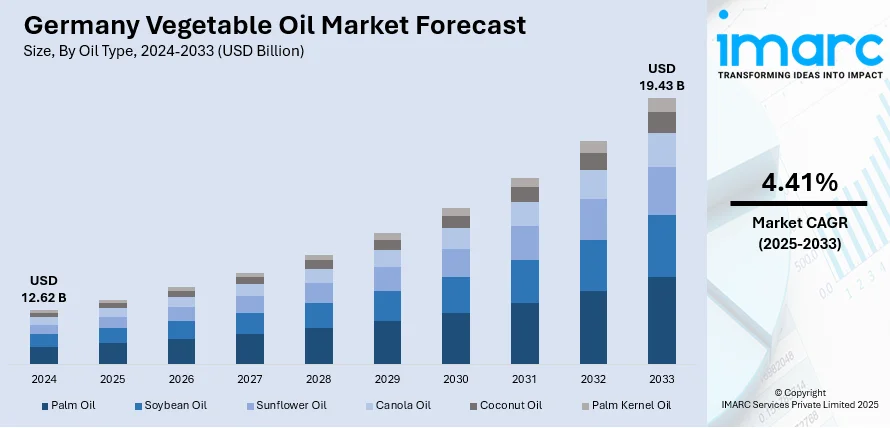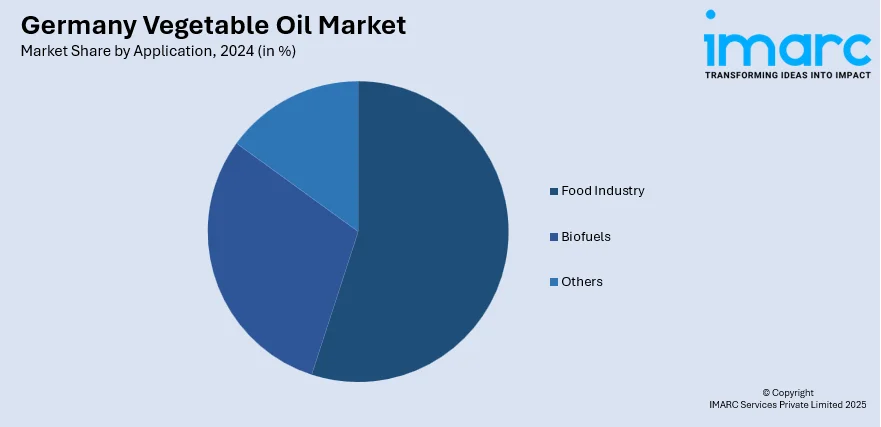
Germany Vegetable Oil Market Size, Share, Trends and Forecast by Oil Type, Application, and Region, 2025-2033
Germany Vegetable Oil Market Overview:
The Germany vegetable oil market size reached USD 12.62 Billion in 2024. Looking forward, the market is projected to reach USD 19.43 Billion by 2033, exhibiting a growth rate (CAGR) of 4.41% during 2025-2033. The market is driven by strong consumer preference for organic, cold-pressed oils in clean-label and plant-based diets. Germany’s large-scale rapeseed cultivation and policy-backed biofuel production contribute to food-energy synergy. Expanding use in biobased lubricants, green chemicals, and cosmetics is further augmenting the Germany vegetable oil market share.
|
Report Attribute
|
Key Statistics
|
|---|---|
|
Base Year
|
2024
|
|
Forecast Years
|
2025-2033
|
|
Historical Years
|
2019-2024
|
| Market Size in 2024 | USD 12.62 Billion |
| Market Forecast in 2033 | USD 19.43 Billion |
| Market Growth Rate 2025-2033 | 4.41% |
Germany Vegetable Oil Market Trends:
Rising Demand for Organic and Cold-Pressed Oils
Germany’s health-conscious consumer base increasingly prefers cold-pressed, organic, and minimally processed vegetable oils. Oils such as rapeseed, sunflower, linseed, and hemp are commonly used in dressings, marinades, and nutritional supplements, often purchased through health food stores, organic chains, and bio-markets. The demand is closely tied to Germany’s leadership in organic food consumption and the country’s early adoption of clean-label standards. Producers are responding with transparent sourcing, pesticide-free certifications, and glass packaging to reflect purity and sustainability. Cold-pressed oils are also sought for their natural taste and preservation of micronutrients like vitamin E and omega-3 fatty acids. Urban populations, particularly in cities like Berlin and Hamburg, are incorporating these oils into vegan and flexitarian diets, driven by growing awareness of diet-related health outcomes. Culinary education through social media, recipe platforms, and wellness influencers is strengthening consumer knowledge about oil types and nutritional profiles. This segment is further supported by specialty e-commerce, which enables direct-to-consumer sales and subscription models. As health, provenance, and purity become decisive factors in food choice, Germany’s domestic and imported vegetable oils aligned with these values are helping shape Germany vegetable oil market growth through quality-driven consumer preference.

To get more information on this market, Request Sample
Sustainability Policies and Rapeseed Cultivation Synergies
Germany is one of Europe’s largest producers of rapeseed oil, and this domestic advantage plays a vital role in reducing import dependency and supporting sustainability goals. Rapeseed cultivation is integrated into crop rotation systems across Saxony, Bavaria, and Lower Saxony, offering agronomic benefits such as soil health improvement and pest control. The oil extracted from rapeseed is used in both edible and non-edible applications, including margarine, salad oil, animal feed, and biodiesel. Germany’s Renewable Energy Sources Act (EEG) and greenhouse gas reduction quotas have long supported biofuel blending, with rapeseed methyl ester (RME) forming the backbone of Germany’s biodiesel supply. Moreover, rapeseed meal, a by-product of oil extraction, is a valuable high-protein animal feed, reducing reliance on imported soy meal. Sustainability certifications such as ISCC (International Sustainability and Carbon Certification) ensure that both cultivation and processing align with EU climate and traceability standards. As German policy increasingly favors climate-smart agriculture and circular bioeconomy models, domestic rapeseed oil’s dual role in food and fuel creates integrated value chains. This vertically aligned system not only enhances self-sufficiency but also supports environmental policy implementation across agriculture and energy.
Industrial and Technical Applications of Vegetable Oils
Beyond food use, Germany’s highly industrialized economy relies on vegetable oils for a range of technical applications, including lubricants, surfactants, coatings, and biopolymers. Rapeseed, linseed, and castor oils are key raw materials in green chemistry, supporting the country’s transition away from petrochemical derivatives. The automotive and machinery sectors, especially in southern Germany, utilize bio-based lubricants and hydraulic fluids made from vegetable oil to meet stringent environmental regulations. Similarly, the cosmetics and pharmaceutical industries incorporate oils for their emollient and stabilizing properties, particularly in organic-certified and vegan formulations. Research institutes and universities across Germany are working in partnership with bio-refineries to explore high-value derivatives from vegetable oils, such as epoxides and polyols used in coatings and adhesives. The government’s National Bioeconomy Strategy and funding from programs such as BioInnovationsWirtschaft provide long-term support for vegetable oil applications in sustainable manufacturing. This multi-sector utility enhances the strategic relevance of vegetable oils in Germany’s industrial diversification and decarbonization efforts. By anchoring vegetable oils in future-focused industries, Germany is ensuring continued demand and innovation beyond traditional culinary uses.
Germany Vegetable Oil Market Segmentation:
IMARC Group provides an analysis of the key trends in each segment of the market, along with forecasts at the country and regional levels for 2025-2033. Our report has categorized the market based on oil type and application.
Oil Type Insights:
- Palm Oil
- Soybean Oil
- Sunflower Oil
- Canola Oil
- Coconut Oil
- Palm Kernel Oil
The report has provided a detailed breakup and analysis of the market based on the oil type. This includes palm oil, soybean oil, sunflower oil, canola oil, coconut oil, and palm kernel oil.
Application Insights:

- Food Industry
- Biofuels
- Others
The report has provided a detailed breakup and analysis of the market based on the application. This includes food industry, biofuels, and others.
Regional Insights:
- Western Germany
- Southern Germany
- Eastern Germany
- Northern Germany
The report has also provided a comprehensive analysis of all major regional markets. This includes Western Germany, Southern Germany, Eastern Germany, and Northern Germany.
Competitive Landscape:
The market research report has also provided a comprehensive analysis of the competitive landscape. Competitive analysis such as market structure, key player positioning, top winning strategies, competitive dashboard, and company evaluation quadrant has been covered in the report. Also, detailed profiles of all major companies have been provided.
Germany Vegetable Oil Market News:
- On October 12, 2023, Canada-based Bioriginal Food & Science Corp. announced its expansion into the German vegetable oil market through the acquisition of Kroppenstedter Ölmühle, a century-old processor of conventional and organic oilseeds. The German firm operates three plants that specialize in producing vegetable oil, oil cake flour, and refined oils for food, cosmetic, and pharmaceutical sectors. This strategic acquisition strengthens Germany’s domestic vegetable oil capabilities and positions Bioriginal to serve rising demand across Europe and beyond.
Germany Vegetable Oil Market Report Coverage:
| Report Features | Details |
|---|---|
| Base Year of the Analysis | 2024 |
| Historical Period | 2019-2024 |
| Forecast Period | 2025-2033 |
| Units | Billion USD |
| Scope of the Report |
Exploration of Historical Trends and Market Outlook, Industry Catalysts and Challenges, Segment-Wise Historical and Future Market Assessment:
|
| Oil Types Covered | Palm Oil, Soybean Oil, Sunflower Oil, Canola Oil, Coconut Oil, Palm Kernel Oil |
| Applications Covered | Food Industry, Biofuels, Others |
| Regions Covered | Western Germany, Southern Germany, Eastern Germany, Northern Germany |
| Customization Scope | 10% Free Customization |
| Post-Sale Analyst Support | 10-12 Weeks |
| Delivery Format | PDF and Excel through Email (We can also provide the editable version of the report in PPT/Word format on special request) |
Key Questions Answered in This Report:
- How has the Germany vegetable oil market performed so far and how will it perform in the coming years?
- What is the breakup of the Germany vegetable oil market on the basis of oil type?
- What is the breakup of the Germany vegetable oil market on the basis of application?
- What is the breakup of the Germany vegetable oil market on the basis of region?
- What are the various stages in the value chain of the Germany vegetable oil market?
- What are the key driving factors and challenges in the Germany vegetable oil market?
- What is the structure of the Germany vegetable oil market and who are the key players?
- What is the degree of competition in the Germany vegetable oil market?
Key Benefits for Stakeholders:
- IMARC’s industry report offers a comprehensive quantitative analysis of various market segments, historical and current market trends, market forecasts, and dynamics of the Germany vegetable oil market from 2019-2033.
- The research report provides the latest information on the market drivers, challenges, and opportunities in the Germany vegetable oil market.
- Porter's five forces analysis assist stakeholders in assessing the impact of new entrants, competitive rivalry, supplier power, buyer power, and the threat of substitution. It helps stakeholders to analyze the level of competition within the Germany vegetable oil industry and its attractiveness.
- Competitive landscape allows stakeholders to understand their competitive environment and provides an insight into the current positions of key players in the market.
Need more help?
- Speak to our experienced analysts for insights on the current market scenarios.
- Include additional segments and countries to customize the report as per your requirement.
- Gain an unparalleled competitive advantage in your domain by understanding how to utilize the report and positively impacting your operations and revenue.
- For further assistance, please connect with our analysts.
 Request Customization
Request Customization
 Speak to an Analyst
Speak to an Analyst
 Request Brochure
Request Brochure
 Inquire Before Buying
Inquire Before Buying




.webp)




.webp)












